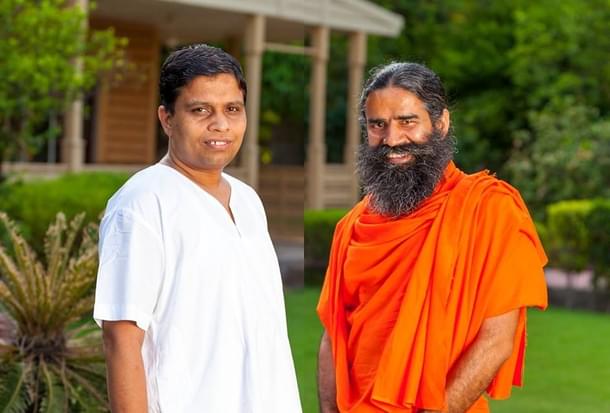News Brief
DRDO’s 2-DG: Anti-Covid Drug Approved By DCGI Was First Studied By Patanjali Researchers
Bhaswati Guha Majumder
May 10, 2021, 10:58 AM | Updated 10:58 AM IST
Save & read from anywhere!
Bookmark stories for easy access on any device or the Swarajya app.


With the country battling the second wave of coronavirus, the Drugs Controller General of India (DCGI) on 8 May approved a drug for emergency use.
The drug is 2-deoxy-D-glucose (2-DG) which has been approved as an adjunct therapy in moderate-to-severe Covid-19 cases.
"Being a generic molecule and analogue of glucose, it can be easily produced and made available in plenty," said the Defence Research and Development Organisation (DRDO).
This drug has been developed by DRDO's Institute of Nuclear Medicine and Allied Sciences (INMAS) in collaboration with Hyderabad-based Dr Reddy's Laboratories.
In April last year, the DRDO’s laboratory collaborated with Hyderabad’s Centre for Cellular and Molecular Biology (CCMB) to find out 2-DG’s usage against SARS-CoV-2.
They discovered that this molecular inhabits the growth of the virus which causes Covid-19.
Later, in May 2020, DCGI permitted a Phase-II trial of 2-DG in Covid-19 patients and the approval was given for Phase-III clinical trials in October.
The Phase-III trial was conducted on 220 patients from December 2020 to March 2021 at 27 Covid-19 hospitals in Delhi, West Bengal, Uttar Pradesh, Gujarat, Rajasthan, Maharashtra, Andhra Pradesh, Telangana, Karnataka and Tamil Nadu.
But there is something related to this drug that is not widely known.
In March 2020, a month before DRDO's study on 2-DG, researchers from Patanjali Research Institute along with experts from Vivekanand Education Society's Institute of Technology and Jain Vishva Bharati Institute published their findings, focusing on 2-DG, which is a radio-chemo-modifier drug used for optimizing cancer therapy.
The study claimed the potential benefits of using 2-DG and its glucopyranose derivative reducing the novel coronavirus infection.
Patanjali’s Study
It was an in-silico study — which is an experiment one performed on a computer or via computer simulation.
The paper was published in Researchgate.net with the title — "Glucose antimetabolite 2-Deoxy-D-Glucose and its derivative as promising candidates for tackling Covid-19: Insights derived from in silico docking and molecular simulations.”
Congrats to DRDO for EUA for 2deoxy-D-glucose, 2DG. An anti-cancer drug, its MoA might be inhibiting glycolysis in virus-infected cells.
— Anand Ranganathan (@ARanganathan72) May 8, 2021
Also appreciate @yogrishiramdev's Patanjali for first suggesting use of 2DG although their hypothesis was that 2DG directly attacks the virus. pic.twitter.com/u9sRCJpL0q
Patanjali’s study said: “The drug can dock efficiently with viral main protease 3CLpro (3C-like protease) as well as NSP15 (coronavirus nonstructural protein 15) endoribonuclease, thus efficiently inactivating these viral receptors leading to incapacitation of the SARS-CoV-2 virus.”
“Such incapacitation was possible by means of the formation of a hydrogen bond between 2-DG and proline residues of viral protease,” the paper further added.
“The 2-DG derivative formed a hydrogen bond with the glutamine amino acid residues of the viral spike glycoprotein,” the study said.
It also noted that since there was no evidence of serious toxicity related to the use of this drug, further empirical studies on model systems and clinical trials on humans to ascertain effective dose-response should be urgently conducted.
It is unclear whether DRDO conducted the study based on Patanjali’s research findings or it acknowledged the initial discovery, led by Patanjali CEO Acharya Balkrishna.
2-DG comes in powder form in a sachet and can be taken orally.
The DRDO study claimed that this molecule helps in faster recovery of hospitalised Covid-19 patients and reduces supplemental oxygen dependence.
An anti-COVID-19 therapeutic application of the drug 2-deoxy-D-glucose (2-DG) has been developed by INMAS, a lab of DRDO, in collaboration with Dr Reddyâs Laboratories, Hyderabad. The drug will help in faster recovery of Covid-19 patients. https://t.co/HBKdAnZCCP pic.twitter.com/8D6TDdcoI7
— DRDO (@DRDO_India) May 8, 2021
It was also found that a higher proportion of infected people treated with 2-DG showed RT-PCR negative conversion in Covid-19 patients.
“The drug will be of immense benefit to the people suffering from Covid-19,” the Ministry of Defence said in a statement.





